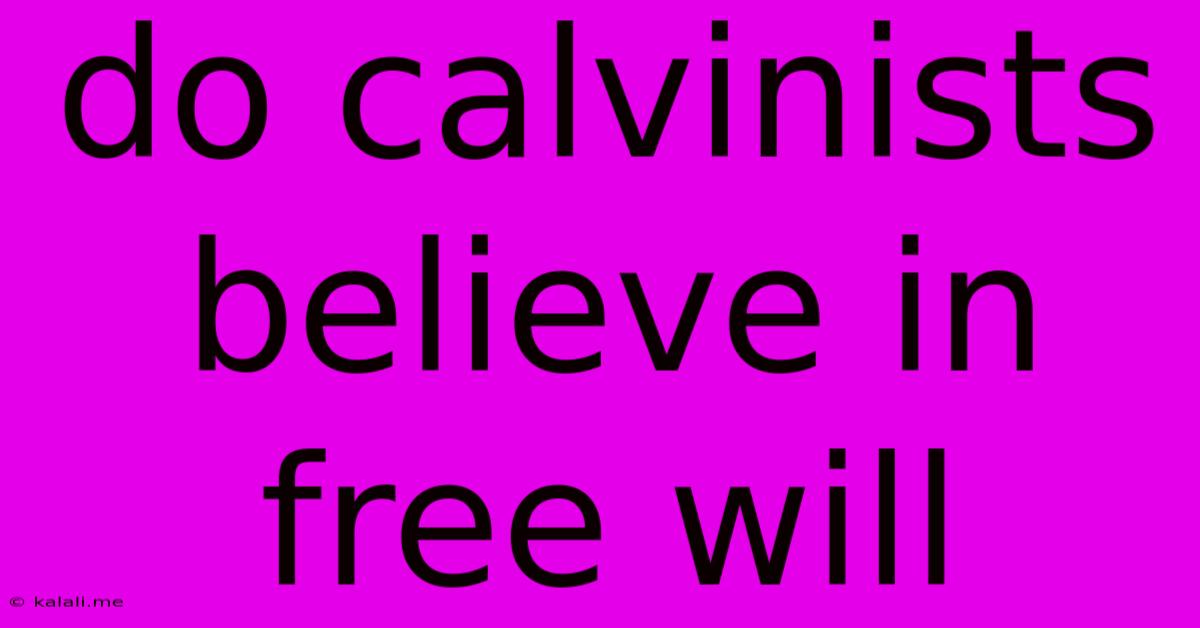Do Calvinists Believe In Free Will
Kalali
Jun 09, 2025 · 3 min read

Table of Contents
Do Calvinists Believe in Free Will? A Deep Dive into Predestination and Human Choice
The question of free will within Calvinism is a complex and often misunderstood one. It's a theological debate that has raged for centuries, sparking intense discussions and interpretations. At its core, the question boils down to this: If God has preordained everything, including salvation, does that leave any room for genuine human choice? The short answer is nuanced: Calvinists believe in a form of free will, but it's significantly constrained by God's sovereignty. This article explores the intricacies of this perspective, examining the key concepts and addressing common misconceptions.
Understanding the Core Tenets of Calvinism (The "Five Points")
To understand the Calvinist view on free will, we need to briefly touch upon the five points of Calvinism, often summarized by the acronym TULIP:
- Total Depravity: Humanity's sin has affected every aspect of their being, rendering them incapable of choosing God on their own. This doesn't mean people are completely devoid of good qualities, but that their inherent sinfulness prevents them from genuinely seeking God without divine intervention.
- Unconditional Election: God chooses who will be saved, not based on any foreseen merit or action in those individuals, but purely out of His grace and sovereign will.
- Limited Atonement: Christ's atoning sacrifice was specifically for the elect, those chosen by God for salvation.
- Irresistible Grace: God's grace, once extended to an individual, cannot be resisted. The elect will inevitably come to faith.
- Perseverance of the Saints: Those who are truly saved will persevere in their faith until the end.
These points, while seemingly deterministic, don't entirely negate free will within the Calvinistic framework. It's a matter of how free will operates within the context of God's sovereign plan.
The Calvinist Perspective on Free Will: A Paradox of Choice
Calvinists generally agree that humans do have a will – the ability to make choices. However, they argue that this will is corrupted by sin and therefore unable to choose God independently. Before regeneration (spiritual rebirth by the Holy Spirit), human choices are ultimately self-serving and directed away from God. This isn't a lack of choice, but a perverted choice, a will enslaved to sin.
The crucial point is that the ability to choose salvation comes from God's grace, not from any inherent capacity within the individual. God, through His grace, regenerates the heart, enabling the individual to choose Him. This is often described as a "willingness to be willing," where God grants the capacity for the individual to respond positively to His call. It's not a forced choice, but a choice made possible by God's intervention.
Addressing Common Misconceptions
- Calvinism is Fatalistic: This is a common misinterpretation. While Calvinism emphasizes God's sovereignty, it doesn't imply a passive, predetermined life for believers. God's plan includes individual responsibility and action within the framework of His overall purpose.
- Calvinism Eliminates Moral Responsibility: This is also inaccurate. While salvation is a gift of grace, Calvinists believe individuals are still accountable for their actions. The emphasis is on God's grace initiating the change, but human responsibility continues after conversion.
- Calvinists Believe People are Robots: This misunderstanding stems from a misinterpretation of predestination. Calvinism doesn't depict humans as mere automatons. Human agency exists, but it's fundamentally influenced and enabled by God's grace.
Conclusion: A Balancing Act
The Calvinist view of free will is a delicate balancing act between God's sovereignty and human responsibility. It's a paradox that acknowledges human choice while emphasizing the pivotal role of God's grace in salvation. While the specifics are debated, the core belief remains: salvation is a gift from God, freely given and received, but received only through the enablement of God's grace working within a human will that is inherently flawed. It’s a perspective that invites further study and reflection, underscoring the enduring complexities of faith and free will.
Latest Posts
Latest Posts
-
How Much Is 7 8 Of A Cup
Jul 01, 2025
-
5 Letter Words With Y As The Only Vowel
Jul 01, 2025
-
How Long Can A Catfish Live Out Of Water
Jul 01, 2025
-
How Many Cups In 12 Oz Chocolate Chips
Jul 01, 2025
-
Did Bill And Gloria Gaither Lose A Child
Jul 01, 2025
Related Post
Thank you for visiting our website which covers about Do Calvinists Believe In Free Will . We hope the information provided has been useful to you. Feel free to contact us if you have any questions or need further assistance. See you next time and don't miss to bookmark.